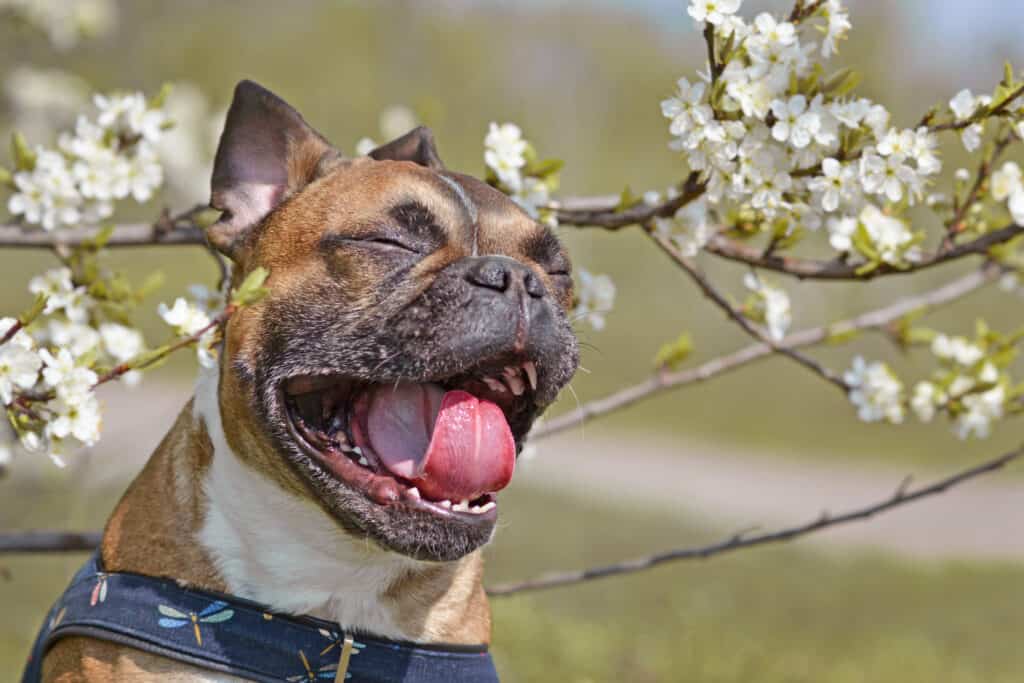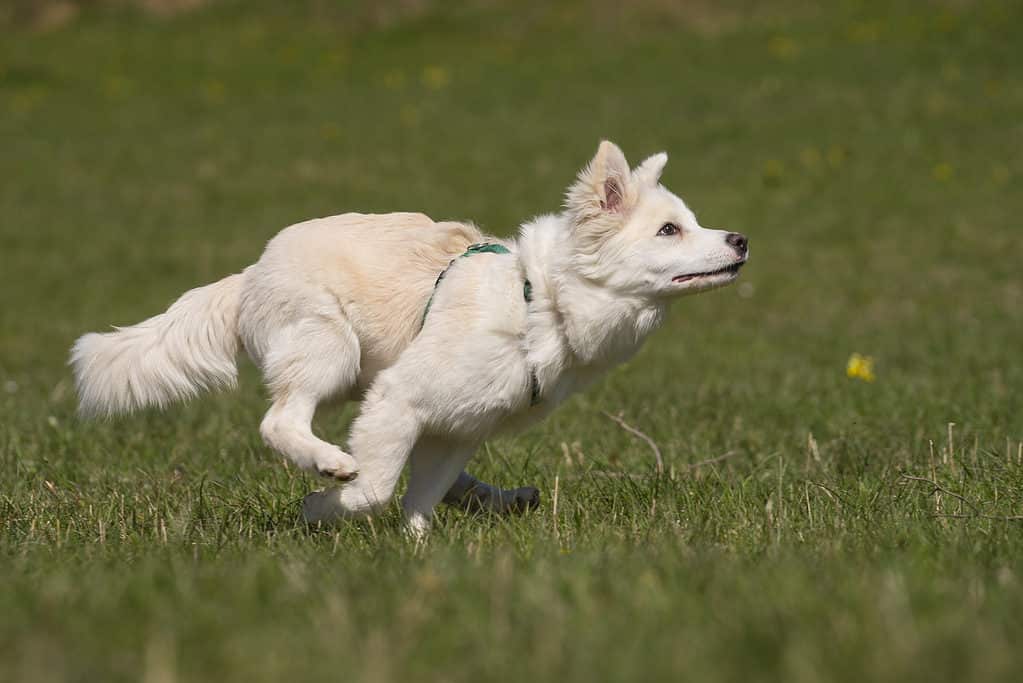If you have a dog that clears the room with its farts on a regular basis, then you are likely wondering why you have such a gassy pup on your hands. Many pet parents hold their noses and wonder how they can put an end to the smells for good, whether their dog is dealing with constant gas or a particularly gassy episode.
While every dog will experience gas from time to time, excessive gas can point to underlying complications in our furry friends. We want to help you get to the bottom of your dog’s overpowering flatulence, so let’s discuss everything you need to know about farting in dogs below.
Let’s dive in!
Do Dogs Get Gas?
Just like in humans, our canine friends are not immune to the occasional case of flatulence. All dogs will experience gas from time to time, with some dogs being more prone to gassy episodes than others. Farting is the body’s way of releasing built-up gas within the digestive tract, so the occasional fart in dogs is completely normal. However, if your dog seems to be having gas all the time, or they are experiencing a day that is much more gassy than usual, this could point to an underlying digestive issue.
How Much Gas Is Normal In Dogs?
Occasional gas is normal in dogs, but frequent gas can point to underlying digestive issues in many canine friends. So just how much gas is too much gas in dogs? Though every dog will vary, more than one or two farts a day can be considered excessive flatulence in dogs. This is even more indicative of an underlying digestive complication if their gas is particularly smelly, or if they are also experiencing other signs of GI upset.
It’s also important to keep in mind that every dog will vary in terms of what’s normal for them, so if your dog that never has gas is suddenly experiencing excessive flatulence, then this can point to an underlying cause of concern. Overall, if your dog is having gas that you notice often, it may be excessive.
My Dog’s Farts Smell Really Bad — Is This Normal?

A dog who passes gas badly enough to clear a room, and frequently, may need a vet visit to determine that digestive health is in working order.
©Krakenimages.com/Shutterstock.com
While your dog’s gas should not smell like roses, it shouldn’t always be powerful enough to clear a room. A dog with frequent smelly gas could be dealing with an underlying digestive issue, ranging from eating food that has gone bad to a sudden switch in its diet. A dog’s gas should not be particularly pleasant, but it shouldn’t knock you off your feet. If smelly gas is common for your dog, then it might be time to take a closer look at their digestive health.
Why Does My Dog Fart So Much?

If your dog seems to flatulate more than seems normal, there could be an underlying condition to blame.
©MODMOD/Shutterstock.com
Now that you are aware of the fact that excessive gas in dogs can point to underlying gastrointestinal complications, it’s time to discuss the most common causes of flatulence in dogs. Ranging from diet changes to swallowing large amounts of air, let’s break down the most common causes of gas in dogs.
Changes in Their Normal Diet
A sudden change in diet is a common cause of gas in our canine companions. Our dogs have a delicate balance of bacteria and intestinal flora that line their GI tract, each of which can be thrown off by a sudden diet change. When this gut flora is disturbed, this can easily lead to GI symptoms like increased gas and diarrhea. This is why we always suggest spreading a diet change out over a 2-3 week period, as this can help to decrease the risk of an upset stomach.
They Ate Something That Upset Their Stomach

Like in humans, an upset stomach could be the cause of your dog’s gas.
©Lee waranyu/Shutterstock.com
Dietary indiscretion is another common cause of gas in our canine companions. Dietary indiscretion in dogs refers to eating anything outside of their standard diet, ranging from rotten food in the trash to a greasy piece of human food. Eating food outside of their normal diet can throw off the GI balance we mentioned above, and it can also introduce harmful bacteria to the digestive tract if the food has gone bad. Greasy foods are also challenging for the dog’s body to digest properly, so this can be an added complication if the food your dog ate was high in fat. Due to these risks associated with dietary indiscretion in dogs, many pups will experience excessive gas as a result.
They Are Not Eating a Quality Diet
If your dog is not eating a quality, veterinarian-approved diet, then this can increase the risk of gas and other undesirable GI complications. Just as humans would struggle with an upset stomach if we were consuming an unhealthy diet each day, our dogs are no different. The best way to make sure that your dog is eating quality food is by making sure your dog food of choice is AAFCO-approved (it will say this on the label), as well as getting approval from your veterinarian.
They Swallow Large Amounts of Air

Because of the unique shape of their face,
French bulldogs
gulp air. This ultimately leads to more farting.
©iStock.com/Firn
Some dogs that swallow large amounts of air are more prone to experiencing excess amounts of gas. For example, brachycephalic breeds like French bulldogs pant and gulp down air due to their abnormal face structure. This causes them to introduce more air to their digestive tract than other dogs. Because of this, these furry friends will often experience issues such as flatulence and burping.
They Have an Underlying Health Condition
If the above factors are not causing your dog’s gas, then it is possible that they are struggling with an underlying gastrointestinal condition of some kind. These issues can include conditions such as food allergies, bacterial infections, inflammatory bowel disease, and even digestive cancers. However, it’s important to keep in mind that these complications are most often accompanied by other concerning GI symptoms as well. Many of these pups will suffer from increased bowel movements, loose stool, diarrhea, bloody stool, vomiting, appetite changes, and even abdominal pain. If you think your dog might be suffering from an underlying GI condition, then we suggest having them seen by your veterinarian.
How Do I Stop My Dog’s Farting?
If you have a gassy dog on your hands, then you are likely searching for ways to limit their constant farting. Thankfully, most cases of gas in dogs can be solved with basic lifestyle changes. Let’s offer you a few of our favorite tips on banishing gas in dogs below!
Nutrition
If your dog is known to be incredibly gassy, then paying close attention to its nutrition is key! This means that not only should you make sure that your dog is eating a quality diet that your vet approves of, but you should also make sure they are not eating items outside of their standard diet regularly. The best diet plan for these pups will involve having quality kibble or wet food they eat each day, as well as a few regular treat options that do not appear to upset their stomach. Wiggle room in their diet can increase the risk of gas, so it’s essential to keep their food intake as regular as possible.
Exercise

Daily exercise could decrease gas in your dog, by regulating its digestive health. It also helps keep bowel movements regular.
©Bildagentur Zoonar GmbH/Shutterstock.com
While this often comes as a surprise to many pet parents, daily exercise can decrease gas in many canine friends. This is due to the fact that daily exercise helps to regulate a dog’s digestive health, as well as keeping their bowel movements regular. Getting your dog up and moving will not only benefit their overall health, but it can cut back on the amount of deadly gas they experience each day.
Probiotics
A wonderful addition to any canine health routine is probiotics. This is especially true for those that struggle with frequent gas. Probiotics can help a dog by introducing good bacteria to the digestive system, supporting the good bacteria, and banishing any overgrowth of bad gut bacteria. The end result is a healthy digestive system that is less prone to episodes of excessive gas! Thankfully for our canine companions, there are many wonderful types of doggy probiotics that you can add to their daily routine.
Final Thoughts
Occasional gas is nothing to worry about in dogs, but excessive gas can point to a disturbance in their digestive health. We encourage you to review the potential factors that could be causing your dog’s gas that we discussed above, and implement the digestive tips to banish their gas once and for all!
Up Next:
- These Are the Best Probiotics for Dogs in 2022 (They Actually Work)
- Best Dog Food for Dogs With Diarrhea
- The Best Sensitive Stomach Dog Food for 2022: Reviewed and Ranked
The photo featured at the top of this post is © MODMOD/Shutterstock.com
Ready to discover the top 10 cutest dog breeds in the entire world?
How about the fastest dogs, the largest dogs and those that are -- quite frankly -- just the kindest dogs on the planet? Each day, AZ Animals sends out lists just like this to our thousands of email subscribers. And the best part? It's FREE. Join today by entering your email below.
Thank you for reading! Have some feedback for us? Contact the AZ Animals editorial team.






